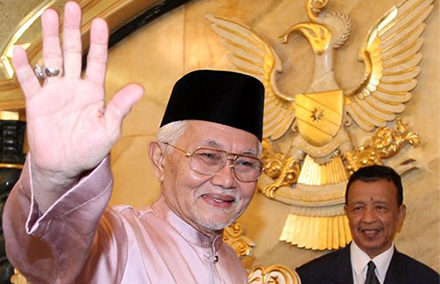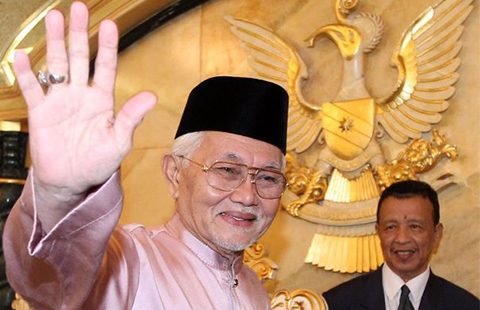
Former Sarawak chief minister, Taib Mahmud.
In the lead up to state elections, old masters still rule from the shadows and stand to gain the most from the vote.
Last week, Adenan Satem, the chief minister of Sarawak, announced that his right-wing Pesaka Bumiputera Bersatu (the United Traditional Bumiputera Party, or PBB) will contest 40 of the 82 constituencies in upcoming state elections. The casual remark to the press was no accident and was highly significant for several reasons.
Adenan is signalling that the state elections will most probably be held in March or April this year. More significantly, by telling the world the number of PBB candidates, he is signalling that politics in Sarawak has not changed since he took over in February 2014. PBB has dominated Sarawak politics since 1970, and nothing has changed since Adenan’s much-hyped takeover in early 2014.
In every state elections since the 1990s, PBB has contested just below 50 per cent of seats. In both the 2006 and 2011 state elections, PBB contested (and won) 35 of 71 seats in the Sarawak Dewan Undangan Negri (DUN or State Assembly). The implications are clear – PBB can rule on its own at any time, but does not grab more than 50 per cent of the seats to show its commitment to the multiracial, four-party Sarawak Barisan Nasional. In fact, it is widely known that some of the winning candidates in the other Sarawak BN parties are “on loan” from PBB or closet PBB members. Thus covertly, PBB controls more than half the seats in the DUN.
Some context is necessary here.
When Adenan took over two years ago, there were expectations that he would reverse some of the excesses involving Taib Mahmud, his predecessor. Taib’s widely-reported kleptocracy was reaching a point where even Putrajaya was embarrassed by the constant news reports of his wealth overseas. In Malaysia alone, Taib and his family allegedly owned more than 400 companies, while his holding overseas was conservatively estimated to be around US $15 billion. One website, Sarawak Report, and an NGO, the Bruno Manser Fund, were largely responsible for exposing the extent of his hidden wealth overseas.
Despite all the evidence, Taib was untouchable for a very simple reason. Najib Razak, Malaysia’s prime minister, needed him to stay in power after the 2013 General Elections. Razak’s UMNO party won 88 seats while Taib’s Sarawak BN delivered 25 seats. Without Sarawak BN, Najib would be out of power. Taib’s PBB is currently the second largest party in the federal Barisan Nasional coalition.
One year later, in February 2014, Taib was sworn in as Sarawak’s Governor and Adenan, his hand-picked successor, became chief minister. Make no mistake; Adenan was a pair of ‘safe hands’. He was married previously to Taib’s sister and he went to school at St Joseph’s in the state capital Kuching with Taib. Adenan even went to the same university (University of Adelaide) and graduated in the same degree (law). Adenan later served for more than two decades in Taib’s cabinet.
Like Taib, Adenan is a master tactician when it comes to Sarawak politics. He understands that Sarawakians (and Malaysians) have short memories. Rather than addressing the issue of Taib’s misdeeds, Adenan went for something that all Sarawakians strongly agree on — Sarawak has gotten a rotten deal in the Malaysian federation.
For the past decade, resentment grew among Sarawakians that their state got very little after helping to establish the Malaysian federation in 1963. The consensus is that Sarawak does not fit into the UMNO’s model of ‘Malay First, Islam First’ mode of governance and that Sarawak would be much better off had it opted for independence.
This wave of Sarawak nationalism could not come at a more opportune time for Adenan, Taib and Sarawak BN.
Using Sarawak nationalism gives Adenan two key political advantages. First it gives him the right to shout “Get non-Sarawak parties out of Sarawak. Sarawak for Sarawakians” (better known as S4S), knowing full well that the biggest threat to Sarawak BN are the Democratic Action Party (DAP) and the People’s Justice Party (PKR).
Although these two parties are part of their national party, in truth they have a lot of autonomy when it comes to Sarawak issues. However, many people are excited about the need to keep Sarawak-based parties in power and to “kick-out Malayan” parties. At present Adenan’s Sarawak BN component parties are all Sarawak-based.
Second, playing the Sarawak nationalism card allows Adenan to deflect all the unresolved corruption issues related to Taib. Adenan claims that he is in charge, and that things are changing. But in reality, all Taib-related companies continue to get government contracts, and all the projects and dams supported by the Taib administration remain in place.
Adenan will not, as the locals say, ‘lawan towkay’ (challenge the boss) who in Sarawak remains Taib.
Taib’s master political move was to simply shift upstairs to the Governorship and control the state from the shadows. Sarawakians, especially those in the rural areas, seem to think that Adenan is really in charge now that his picture appears daily on the front page of local Sarawak papers.
There is little doubt that Adenan and Sarawak BN will win big in this year’s vote. In the last state election, Sarawak BN won 55 of 71 seats. Thirteen of the 16 seats won by the opposition were in urban, largely Chinese-majority constituencies. A repeat is expected in the 2016 race.
Sarawak DAP is still the undisputed champion of the urban Chinese, but Adenan’s personal popularity coupled with the Sarawak nationalism card will mean it will be tough for Sarawak DAP’s dream of moving into native and semi-urban constituencies. There is even the possibility that Adenan’s popularity will lead to reduced majorities for DAP in Chinese seats.
But, the two big winners for the upcoming polls will be Najib Razak and Taib Mahmud.
Najib can claim some credit for Sarawak BN’s victory given that he has given leeway for Adenan to condemn UMNO publicly in Sarawak. Adenan often openly speaks negatively about UMNO’s race politics in Sarawak and vows not to allow UMNO into Sarawak. This is wildly popular among the “Sarawak for Sarawakians” crowd.
In fact, it is so popular that the main NGO behind the S4S campaign was forced to support Adenan’s call for complete autonomy from Putrajaya, effectively supporting the Sarawak BN and Taib. A strong showing by Adenan will reinforce Najib’s claim that he can rely on the “fixed deposit” from East Malaysia in the next general elections.
The ultimate winner is Taib Mahmud. Despite all the negative news reports, police reports, documentaries, and worldwide campaigns, he is still untouchable and sitting pretty in the Astana Palace. He is probably more “successful” than either Suharto or Marcos. The only contemporary leader who comes close to what Taib has “achieved” is Hun Sen of Cambodia.
Najib’s 1MDB shenanigans are peanuts compared to Taib and his family’s wealth but attracts all the attention. Is it any wonder that Taib’s nickname is White Rajah of Sarawak?
James Chin is Director, Asia Institute, University of Tasmania
 Facebook
Facebook  Twitter
Twitter  Soundcloud
Soundcloud  Youtube
Youtube  Rss
Rss 